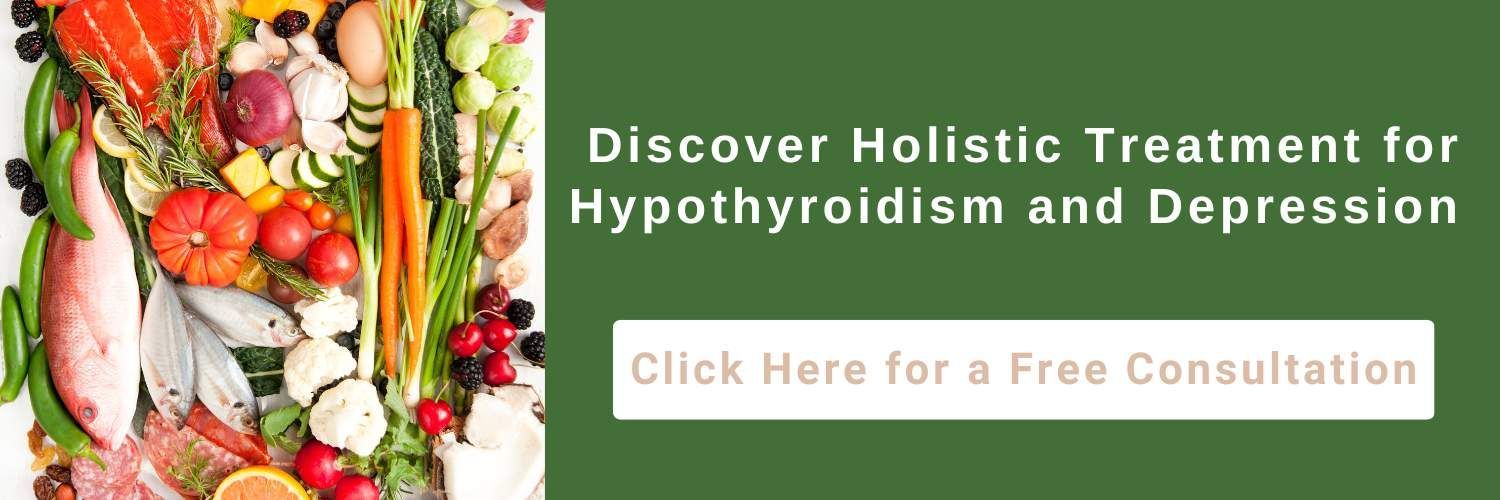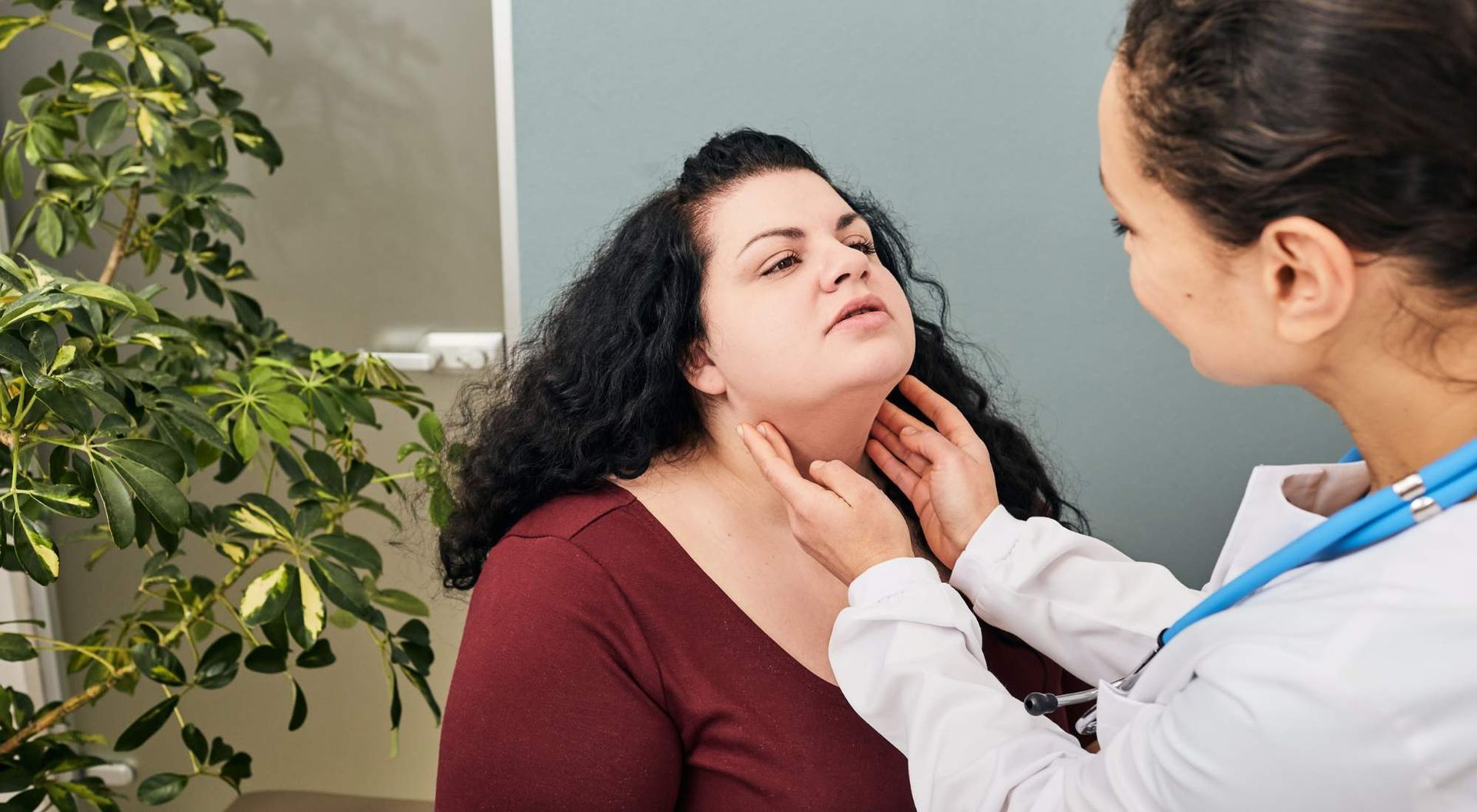Connecting the Dots Between Hypothyroidism and Depression — How They’re Related and Possible Treatment Options
"The content below is not intended to be a substitute for professional medical advice, diagnosis, or treatment. Always seek the advice of your physician or other qualified health provider with any questions you may have regarding a medical condition."
Sometimes when you’re not feeling yourself, it can be difficult to know if you’re experiencing symptoms of a physical or mental condition. For instance, hypothyroidism develops slowly, and some of the earliest symptoms of the condition closely mimic those exhibited in major depressive disorder.
If you’ve been experiencing …
- Fatigue
- Sluggishness
- Weight gain; or
- Trouble concentrating
… it may be time to consult with your doctor. Proper diagnosis is the first step to alleviating the depressive symptoms caused by hypothyroidism.
Read on to learn about the link between hypothyroidism and depression and how treatment can help you regain your health and happiness.
Table of Contents
Can Hypothyroidism Cause Depression?
Yes! Hypothyroidism is a condition in which the thyroid gland does not produce enough thyroid hormones to regulate your body’s needs. Thyroid hormone deficiency can impact the brain’s structure and function, ultimately causing changes in mood.
Hypothyroidism is known to cause various mental health symptoms such as:
- Fatigue
- Increased irritability
- Changes in sleep
- Anxiety
- Loss of interest
- Difficulty concentrating
- Memory problems
- Slow speech
Many people with undiagnosed thyroid disease may mistake these as symptoms of depression. If your symptoms do not improve with depression treatment, or if you are also experiencing other symptoms such as …
- Weight gain
- Sensitivity to cold
- Dry, flaky skin
- Sparse, dry hair
- Hoarse voice
- Hand tingling or pain (carpal tunnel syndrome)
- Slower heart rate; or
- Headaches
… consult with your doctor for further testing.
Explaining the Connection Between Depression and Hypothyroidism
Biological Mechanism
Your thyroid gland is responsible for regulating several vital bodily functions. An underactive thyroid can cause depressive symptoms in a number of ways:
- Thyroid hormones, specifically thyroxine (T4) and triiodothyronine (T3) play a significant role in brain chemistry and energy production. These hormones regulate neurotransmitters that are crucial for mood stabilization, such as serotonin, norepinephrine, and dopamine. Hypothyroidism causes imbalances in these hormones, which are commonly linked to depression.
- Thyroid hormones serve to regulate your body’s metabolism. A low metabolic rate can lead to decreased energy levels, which is a common symptom of depression.
- Some
studies have linked hypothyroidism with changes in the brain’s structure. Particularly, hypothyroidism has proven to affect areas of the hippocampus responsible for mediating attention, motor speed, and working memory.
Symptom Overlap
Without proper medical evaluation, it can be difficult to distinguish between depression and hypothyroidism. The two conditions share several overlapping symptoms, such as:
- Fatigue
- Weight gain
- Mood changes
- Sleep disturbances
- Difficulty concentrating
- Decreased motivation
Over time, untreated hypothyroidism can lead to other health problems, such as
high cholesterol and
heart disease. This is why healthcare providers need to test thyroid function in patients presenting with depression, especially if it has not improved with treatment.
Risk Factors
Those with undiagnosed, untreated, or undertreated hypothyroidism may have an increased risk of developing depression due to its impact on energy levels, stress response, and mood regulation. Additionally,
some studies have found that oral treatment for major depressive disorder may alter thyroid function.
Screening and Diagnosis
Healthcare professionals may screen for thyroid dysfunction, such as hypothyroidism, if a patient presents with symptoms of depression. Proper diagnosis and treatment of hypothyroidism are essential to alleviating depressive symptoms.
Diagnosis of hypothyroidism often begins with measuring
thyroid-stimulating hormone (TSH) levels in the blood. If the result is high, the test is repeated, along with a blood test for the thyroid hormone T4. If the results show that TSH is high and T4 is low, then the patient is diagnosed with hypothyroidism.
Hypothyroidism and Depression: Are the Treatments Mutually Exclusive?
The treatments for hypothyroidism and depression are not mutually exclusive. Thyroid hormone replacement medications often alleviate depressive symptoms if they are directly caused by the thyroid hormone deficiency. However, if depression persists, additional treatment may be necessary.
3 Treatment Options for Hypothyroidism That May Also Help With Symptoms of Depression
Thyroid hormone replacement therapy is a safe, effective method of treating hypothyroidism.
The treatments work by replacing thyroxine (T4) and triiodothyronine (T3) hormones that are normally produced by the thyroid gland. Proper dosage and compliance with medication can stabilize thyroid hormone levels and alleviate depressive symptoms caused by hypothyroidism.
Below, we’ll describe the most commonly prescribed thyroid hormone replacement medications and explain how each treatment may work to alleviate depressive symptoms.
#1: Levothyroxine (T4) Medication
Levothyroxine is the most commonly prescribed medication for primary, secondary, and tertiary hypothyroidism. It is a synthetic version of thyroxine (T4) –- the body’s natural thyroid hormone.
Levothyroxine has proven to be effective in stabilizing thyroid hormone levels and alleviating symptoms of hypothyroidism in most patients. However, some
studies show that around five to ten percent of patients undergoing T4 treatment experience persistent symptoms of hypothyroidism, such as fatigue and mood disturbances.
#2: Liothyronine (T3) Medication
In addition to levothyroxine, your doctor may prescribe liothyronine. Liothyronine works by replacing the triiodothyronine (T3) with a synthetic form of the hormone.
This medication is recommended for those who do not respond well to levothyroxine medication alone. Liothyronine is more rapidly metabolized but has a shorter duration compared to levothyroxine.
#3: Natural Desiccated Thyroid (NDT)
Natural Desiccated Thyroid (NDT) was the first treatment for hypothyroidism. NDT is a natural drug made from the thyroid glands of pigs or cows. Unlike synthetic treatments for hypothyroidism, NDT replaces both thyroxine (T4) and triiodothyronine (T3) hormones.
Although it is not as commonly prescribed as levothyroxine and liothyronine, NDT is a popular choice among those seeking a natural thyroid hormone replacement treatment.
Considerations To Make When Receiving Treatment for Hypothyroidism and Depression
Dosage Adjustments
The optimal dose of thyroid hormone replacement medication may vary based on a patient’s age, weight, or other medical conditions. Medication is typically initiated in a low dosage and is then gradually increased based on laboratory values taken every six to eight weeks to measure thyroid hormone levels.
Consistency
Thyroid hormone replacement medication provides steady levels of T3 and T4 hormones in the bloodstream. In order to keep levels within a normal range, it is best to take medication consistently, preferably at the same time each day. The optimal time to take thyroid medication is in the morning on an empty stomach. This is because certain foods or other medications may interfere with absorption.
Monitoring
Your medication dosage may need to be adjusted by your healthcare provider periodically to keep your thyroid levels within normal range. Your physician will do this by regularly performing physical examinations and blood tests to check TSH (thyroid-stimulating hormone) levels.
Lifestyle Considerations
Maintaining a healthy lifestyle is crucial to maximizing treatment effectiveness and improving symptoms of depression.
However, there are several dietary components, medications, and supplements that can affect thyroid medication absorption, so it’s important to discuss these with your healthcare provider.
Have you been diagnosed with hypothyroidism and are looking for natural ways to improve your physical and mental health?
At
HealthierU, we take a holistic approach using nutrition as a tool that may help you ease depressive symptoms of hypothyroidism. Contact us today for a free consultation.
Compliance
For thyroid hormone replacement therapy to be effective, patients must adhere to the prescribed medication regimen. Skipping doses or taking the medication inconsistently can result in an imbalance in thyroid hormone levels and continuing symptoms of anxiety or depression.
What Should You Do if Treatment for Hypothyroidism Isn’t Helping Alleviate Your Depression?
In some cases, patients with hypothyroidism may experience persistent depressive symptoms despite undergoing effective treatment for the condition.
If you’ve found yourself in this situation, here are some next steps to consider taking in your search for depression relief:
- Reevaluate your thyroid medication – Consult with your doctor to ensure your thyroid hormone levels are within the optimal range. Your thyroid hormone replacement medication may need to be adjusted to help alleviate your symptoms.
- Consult a mental health professional – If your thyroid hormone levels are within optimal range and you are still experiencing persistent depressive symptoms, it may be time to contact a mental health professional. A psychiatrist will be able to provide a comprehensive assessment and treat your depression separately.
- Psychotherapy – Talk therapies such as cognitive behavioral therapies (CBT) have been shown to improve depression. This may be the best alternative to oral medication for depression, which could possibly affect the absorption of your thyroid hormone replacement medication.
- Medication for depression – If depression persists, your doctor may recommend an oral medication such as SSRIs, non-SSRIs, or tricyclic antidepressants. Some depression medications may interfere with the absorption and efficacy of your thyroid hormones, so be sure to review all medications with your healthcare provider.
- Lifestyle changes – You can improve your depression naturally by implementing healthy lifestyle changes. A healthy diet, regular exercise, and sufficient sleep have all been shown to improve mental health, regardless of the underlying cause.
- Stress management – Stress management techniques such as mindfulness and meditation are proven to help in reducing anxiety-provoking thoughts. They allow your brain to observe, evaluate, and replace those thoughts with more positive ones. You might try engaging in yoga, progressive muscle relaxation, guided imagery, or breath awareness meditation.
- Support system – You don’t have to endure the challenges of hypothyroidism alone. Consider joining a support group to connect with others who have experienced similar challenges and can help guide you through the recovery process.
There will likely not be one cure-all answer for your depression. Many patients with hypothyroidism find that a holistic approach that combines medical treatment, mental health support, and healthy lifestyle choices is the most effective strategy for managing their depression.
HealthierU: Providing Holistic Support for Hypothyroidism and Depression
If you’re experiencing persistent adverse effects of hypothyroidism and are searching for a natural way to get well and stay well, Dr. Donna Sergi and HealthierU can help.
Dr. Sergi has a deep understanding of the dynamics created by hypothyroidism and depression. With decades of experience, she is dedicated to using natural remedies to challenge the effects of chronic illness in a holistic way.
At HealthierU, we help patients to develop and implement an action plan using:
- Whole food supplementation
- Lifestyle changes
- Nutrition guidance
- Exercise; and
- Chiropractic care
Contact us today to start the journey to a healthier, happier you.





